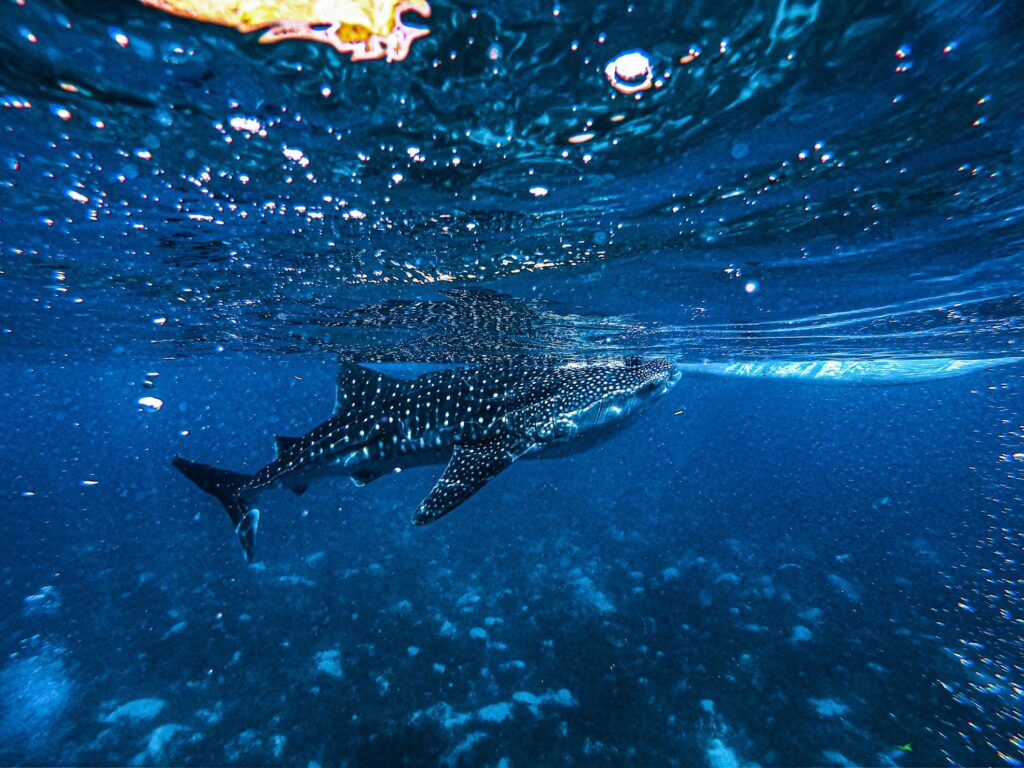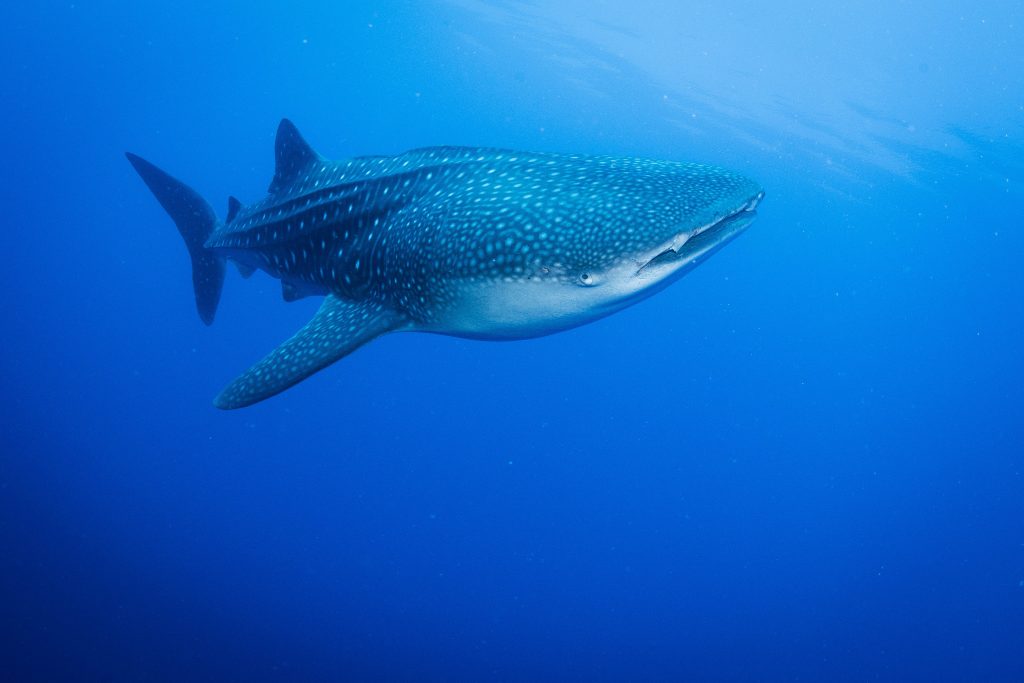The Philippines is one of the best places to see whale sharks, thanks to its warm, tropical waters. These gentle giants, known for their distinctive white spots, attract divers and marine enthusiasts year-round.
Swimming with whale sharks is an unforgettable experience, but if not done responsibly, tourism can harm both the sharks and the marine ecosystem. To ensure a sustainable encounter, it’s important to choose responsible tours that protect their natural behavior and habitat.
Here’s a quick guide to the current state of whale shark tourism in the Philippines and the best sustainable options!
Current State of Whale Shark Tourism in the Philippines
The Rise of Whale Shark Tourism
Swimming with whale sharks has become one of the most popular attractions in the Philippines over the past two decades, particularly in certain coastal areas. The industry has generated income and created jobs, from tour guides, boat operators, and souvenir sellers. What’s more, the locals’ reliance on whale shark tours also means that these creatures are protected instead of getting hunted.
In addition, tour operators have also established several ground rules to further protect the whale sharks, such as prohibiting the use of sunscreens that aren’t safe for reefs, maintaining a safe distance, and not touching the whale sharks. However, these tours still pose ecological risks that may have long-term effects on the whale sharks and their marine environments.
Environmental Impacts

There are several environmental impacts that are caused by whale tourism, particularly ones that don’t prioritize responsible and sustainable practices. Generally, the biggest concern around this type of tourism is provisioning or hand-feeding the whale sharks to attract them.
While provisioning typically guarantees whale shark encounters (as these creatures would come to the area to feed), this action can alter their natural behavior, making them dependent on human interaction and disrupting their migratory patterns.
Additionally, overcrowding and improper tourist behavior, such as getting too close or touching the sharks, can cause stress and injury to the whale sharks. Boat traffic in popular whale shark destinations also increases the risk of the sharks getting injured by propellers and pollution, further threatening their well-being.
Ethical Concerns
Beyond environmental concerns, the ethical aspects of whale shark tourism also need to be considered. As stated above, provisioning or hand-feeding is a huge concern as it can make these sharks dependent on human-provided food.
However, the impact of provisioning doesn’t stop there. There are other unintended consequences, such as causing the whale sharks to associate boats with feeding opportunities, which could put them at risk in certain situations. Additionally, the krills which are often used to feed the sharks, may not fully meet their dietary requirements, potentially impacting their health.
At the same time, local communities face a complex balance between economic benefits and conservation efforts. Addressing these challenges requires cooperation between local governments, NGOs, and communities to promote more sustainable whale shark tourism.
A Responsible, Sustainable Way to Enjoy Whale Shark Tourism
If you want to swim with whale sharks in the Philippines while respecting both the animals and their natural habitat, consider exploring with Solitude World’s liveaboards. Our liveaboards prioritize sustainable diving practices to ensure minimal impacts on marine life, all while providing an unforgettable experience.
More than Whale Sharks: Exploring Biodiversity in Philippines

Solitude World’s liveaboards will take you to the wonderful Tubbataha Reefs Natural Park, a marine protected area and world-renowned scuba diving site located in the middle of the Sulu Sea, the Philippines. The area has strict conservation policies, which help protect the marine environment and allow sea creatures to thrive. It is also a part of the whale shark’s migratory route, which means you have the chance of encountering these magnificent creatures in their natural habitat.
Aside from the beautiful whale sharks, Tubbataha Reefs is the habitat for many other fascinating marine life, like hammerhead sharks, manta rays, sea turtles, clownfish, and sea critters like nudibranchs and seahorses. The park’s remote location also means there are far fewer tourists than other destinations in the Philippines, reducing human disturbance.
Commitment to Eco-Friendly Options and Responsible Diving Practices
In addition to taking you to dive in an area that prioritizes environmental stewardship, our liveaboards also integrate sustainability into their design, using responsibly sourced materials, energy-efficient lighting, and minimizing waste through a comprehensive waste management policy. By taking these measures, we strive to minimize our environmental footprint.
We also implement responsible diving practices to protect marine life and their habitats. Our dive guides are ready to inform you of the guidelines for diving responsibly, allowing you to appreciate sea creatures respectfully. Our team also actively engages in conservation efforts, including educating guests on the best practices for preserving marine biodiversity and participating in clean-up events to protect nature.
Partnership with Local Communities
Sustainable tourism isn’t just about protecting nature, it’s also about empowering local communities. At Solitude World, we partner with local businesses, source goods and services locally, and create economic opportunities that support long-term community growth while preserving cultural heritage.
We actively hire and train local dive guides and hospitality staff, providing them with skills to thrive in the tourism industry. Our dive guides possess deep knowledge of marine life and responsible tourism, which can enhance your dive experiences while ensuring ethical wildlife interactions. By fostering community pride and involvement in conservation, we help create a cycle where both people and nature benefit.
Explore Ethical and Sustainable Whale Shark Experience with Solitude World!

Sustainable tourism is extremely important for marine conservation and community empowerment. By supporting responsible tourism, local communities gain economic opportunities, fostering a deeper connection to their environment and cultural heritage. This, in turn, will encourage more people to take action in conservation efforts, ensuring that both people and nature thrive for generations to come.
As awareness of tourism’s environmental impact grows, choosing ethical travel options has never been more important. You can make a difference by selecting accommodations and tour operators that prioritize sustainability—like Solitude World’s Liveaboards and Resorts. Our liveaboards take you to Tubbataha Reef, one of the best and most ethical places in the Philippines to dive with whale sharks. With PADI-certified guides, we ensure respectful marine interactions while protecting the ocean’s fragile ecosystems.
Ready to embark on a responsible marine adventure? Book your stay with Solitude Liveaboards and Resorts today!